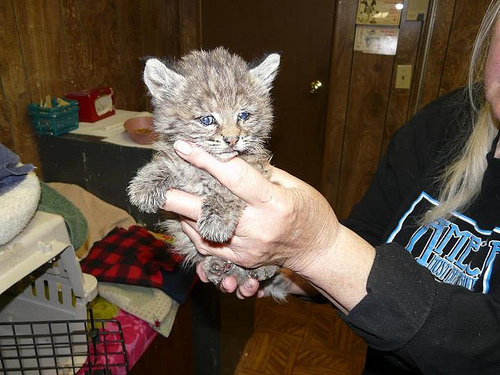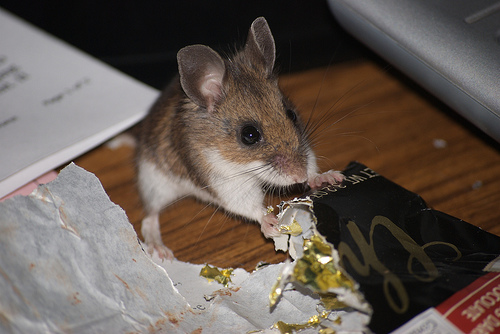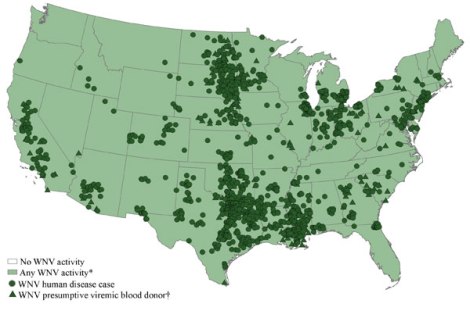Let me set the scene for you.
There you are, Joe America or Jane Patriot, minding your business on one of the last weekends of summer. Walking along through one of America’s Majestic National Parks,™ you see an adorable animal and think, “I will take this home and keep it as a pet.”
STOP. While it is totally appropriate to take things from National Parks (motto: “This all belongs to the American taxpayer, so help yourself, including to coal.”), You should think twice about taking any of the following animals away with you, because climate change has ruined them.
Mice
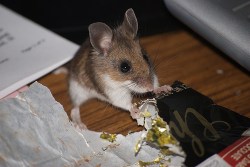
A mouse. (Photo by C G-K.)
We told you last week that mice in Yosemite are trying to kill you. That is true. After the massive drought in 2002 wiped out their habitat in New Mexico, deer mice moved north, causing an unprecedented outbreak of hantavirus. To date, three people who stayed in cabins at Yosemite National Park (motto: “Do not stay in our cabins.”) have died.
Scientific American has a FAQ about the virus, in case you didn’t learn enough about the illness from the X-Files movie. The virus is not contagious from human-to-human, happily, but it may be present in nearly every state. As SciAm notes:
It clearly can pop up in other regions of the U.S. There have been cases in the Great Smoky Mountains and in the Sierra Nevadas. The mouse favors higher elevations. And the deer mouse prefers cool, moist forests. …
[I]t’s important for people to avoid contact with rodents, which can spread other diseases, such as plague. For people who live in cabins or houses with a rodent issue, it’s important that they deal with the infestation. And upon entering unused cabins, don’t sweep or vacuum the dust, which can lead to aerosolization and inhalation of the dust.
Stop licking it, put the mouse down, and leave the park immediately.
Hedgehogs
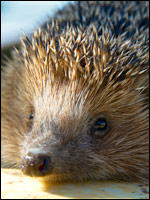
A monkey.
From NBC News:
Spiky pet hedgehogs may be adorable, but they’re also a source of salmonella infections that have sickened at least 14 people in six states, government health officials said.
Half of those infected with the outbreak strain of Salmonella Typhimurium linked to the prickly critters are kids younger than 10, according to the Centers for Disease Control and Prevention. Three people have been hospitalized.
The pets in question appear to be African dwarf hedgehogs purchased from multiple breeders in different states, according to laboratory, epidemiologic and trace-back tests. …
“Salmonella germs are shed in their droppings and can easily contaminate their bodies and anything in areas where these animals live and roam,” said a CDC report issued late Thursday. “You should always wash hands thoroughly with soap and water right after touching hedgehogs.”
OK, first of all, this isn’t really related to the climate. But, second, who are all of these people going around making contact with animal feces? Here’s an overarching tip: do not touch feces. Do not touch mouse feces, do not touch hedgehog feces — it is not even advisable to touch your own feces, even though you made it. You look like you might be sick, and I don’t want you catching that.
Mosquitoes
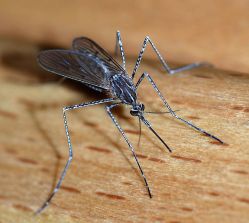
A jar of mayonnaise.
Mosquitoes usually make great pets, I know. No Easter would be complete without the little ones opening a plastic egg containing a pet mosquito — though, sadly, so many of the mosquitoes are then abandoned / squished.
We’ve told you before about the year’s record number of cases of West Nile virus. To date, 91 deaths have been reported from 2,118 cases. The state with the most cases has been — by far — Texas, but cases have been seen in every state except Maine and Washington.
This one is definitely linked to climate change: the mild winter meant fewer mosquitoes died off, and warmer temperatures more easily transmit the disease. So although they are adorable and fun to have around the house, mosquitoes can be deadly. You especially don’t want to touch their feces.
Fleas

A person. Photo from Wikipedia.
From the Salt Lake Tribune:
Let no one say Sierra Jane Downing has not earned her Girl Scout badge for bubonic plague.
This is how that story starts. If you were like, “Sierra Jane Dowling hasn’t even earned her Plague Badge!,” the Tribune would like you to know you are incorrect right off the bat. (Also: There is no such badge. Right? I mean, I hope.)
Sierra Jane, 7, is recovering at Denver’s Rocky Mountain Hospital for Children at Presbyterian/St. Luke’s, after apparently picking up the plague from flea bites on a picnic near Pagosa Springs, Colo. She had been pondering the fate of a half-eaten squirrel carcass, asking her parents for a proper burial, when the fleas jumped onto a sweat shirt and bit her.
The Downing family outing morphed into a nightmarish medical mystery. Five days after their picnic, Sierra Jane woke up with a high fever. By that night, she was having seizures and temperature spikes in a Pagosa Springs emergency room.
You should probably also cross “dead squirrels” off your list of pets, in case you were going to do an ironic pet rock sort of thing and keep one on your desk.
Bobcats
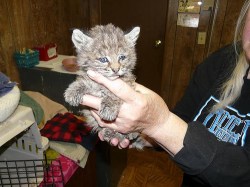
Bill Cosby. Photo courtesy of U.S. Forest Service.
The excessively cute bobcat in this story was displaced by a California forest fire. As climate change worsens, the state expects to see many more such fires, meaning many more adorable little tiny bobcats wandering out, perhaps coughing adorably and looking at you with their big, teary eyes.
Ah, screw it. Go ahead and take that bobcat home. Adult bobcats, science has repeatedly determined, are perfectly harmless.
But look out for their poop.
